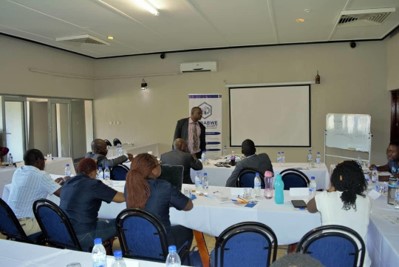High level Technical dialogue: synergizing Training Institutions and companies: what needs to be done?
 Mr. Masawi leading the discussion
Mr. Masawi leading the discussion
The session was chaired by Mr Masawi. He gave the narrative emanating from a presentation by Mr Madzima highlighting gaps identified and the recommendations suggested. The conference leant that there is poor relationship between industries and training institutions in Zimbabwe. Tertiary institutions – Industry direct linkages provide direct industrial problem solutions through research and technology development. Once our local industries developed strong linkages with local tertiary institutions, there will be assurance for innovation and economic development since all that is required will be obtained locally.
The industry – tertiary institutions linkage is not a new phenomenon worldwide. In South Africa, SASOL and Mintek are in partnership with various universities. In developed countries, companies are developed from training institutions, they do have prototype industrial plant at the developing (parenting) institution. Training institutions use these prototype plants to develop cheaper and efficient processes and product which will then be adopted by the industry. On the other hand, if an industry encounters a problem they contact the parenting institution to investigate and provide solutions. This kind of bonding is permanently keeping industries running efficiently and academic more competent and always open up for postgraduate scholarships funded by the industry.
The saddest thing is that, most multilateral companies are linked to foreign universities in countries where these companies were parented. These kinds of relationships are easily affected by political influences. The economy is not benefiting from such kind of relationships neither our education system. This is why companies like Ziscosteel are failing to function despite efforts to make it up and running. In Zimbabwe we do have plants which serve the public such as water treatment plants. No one knows where are their prototype plants. If we could develop prototype plants for our water treatment plants at our tertiary institutions, researchers at that particular institution will be working on whether the plant is capable of functioning properly in light with increased pollution levels in our water bodies, cheaper treatment methods and options, effectiveness of cleaning and also providing solutions to other problems that are being faced at these institutions. Our tertiary institutions should be there to provide solutions to our industries whilst our industries produce for the country.
The conference noted that chemistry is a key player in our industrial development, it should lead in linking industries and universities. Government is requested to support this initiative. This kind of relationship requires training institutions to be competitive. The conference tasked all chemistry laboratories at all tertiary institutions to be certified or be accredited. Investors need confidence in their results that is why multilateral companies are keeping themselves in touch with universities in developed countries that are ISO certified or accredited. The trend in most of these universities is to set up competent research facilities which will be offering such services. The current education system 5.0 is designed to accommodate such arrangement. The local training institutions are being encouraged to display their innovation and research activities on their website. Chemistry should be visible on the website. The chemistry departments should engage on community assistance programs and activities so that communities will benefit and also inculcate the spirit of community assistance and plough back based research activities amongst its students.
The conference recognised the work that was done by training institutions through academic researches which pin point the sources of the problem that presence both direct and indirect impact on our country and possible solutions, ZCS was tasked to develop national database with all chemistry and allied fields with such research work. The database should be accessible by everyone be it industrialists or government departments.
The conference also noted the weak relationship that was existing between government departments and institutions, and training institutions. This was however resolved although a lot is still to be done to cement the cohesion and promote smooth transfer of information. The conference noted with concern lack of research facilities and equipment in Zimbabwe. Most chemistry and other science fields researches are being carried out in foreign institution leaving our education system weak and incompetent in global arena. ZCS and the department of science and technology (MHTE&STD) has been tasked to come up with central laboratories equipped with sophisticated instruments and should be open to all training institutions in Zimbabwe. Industries had been encouraged to support training institutions by donating instruments.
Researchers at training institutions had been encouraged to come up with investable projects, in return they should get company shares. The model should benefit the researcher, training institution and the professional field at last. This will create industry-training institution- researcher ownership with professional accountability. ZCS will work on developing that model.
ZCS was tasked to spearhead collaborative initiatives and come up with engagement conferences and expos where investors will be called to look for investable project exhibited by chemistry and allied researchers and innovators ready for commercialisation but seek funding and collaboration. ZCS was also tasked to enculturate research as well as activities that will benefit our communities through the introduction of awards and scholarships.